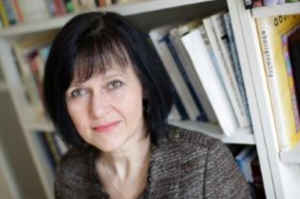Maja POVRZANOVIĆ FRYKMAN
 Maja POVRZANOVIĆ FRYKMAN
Maja POVRZANOVIĆ FRYKMAN
Malmö University
Affect, materiality and corporeality: contributions to research on war and migration
Taking up the distinction between affect and emotion, the lecture will argue for a sustained
inclusion of the lens of affect in ethnological and anthropological research. While paying particular attention to how affects are related to bodies and things, I will exemplify the contribution of this lens to two fields of my long-term research interest, pertaining to personal experiences in war and migration contexts.
Firstly, building on research with recipients of humanitarian aid in Sarajevo in 1990s, I will highlight how corporeal memories of war are brought to the surface in the situation of interviews two decades later. Affect theory allows for an understanding of the ambiguities of victimhood, as well as of local perceptions of post-war hierarchies on different scales. I claim that the affective aspects of war experiences are central to understanding post-war socio-cultural and political processes.
Secondly, utilising insights gained in a project on museums as arenas of refugee integration in Sweden, I develop the notion of ‘affective integration’. I claim that the lens of affect facilitates an understanding of the often invoked but vaguely defined ‘feeling at home’ that is not linked to migrants’ access to rights and formal inclusion, but rests on material and
corporeal experiences that tend to be overlooked in migration research.
SHORT BIOGRAPHY
Maja Povrzanović Rrykman in is professor of ethnology and teaches at the Department of Global Political Studies, almö University. She has also been teaching in the PhD programme in Ethnology and Cultural Anthropology at the University of Zagreb, coordinating the IMISCOE research group TRANSMIG – Transnational Practices in Migration, and serving as a member of the Croatian Science oundation’s Scientific Committee for Social Science and Humanities.
Her publications based on research on war experiences undertaken at the Zagreb Institute for Ethnology and Folklore Research, include articles in the journals Ethnologia Europaea, Ethnologie rançaise and Current Anthropology, and chapters in edited volumes such as War, Exile, Everyday Life, the Greenwood collection Daily Lives of Civilians in Wartime Twentieth – Century Europe, and the Blackwell Companion to the Anthropology of Europe.
Theoretical interest in place and identification processes enabled her to connect war-related
research with concepts and practices in the domains of diaspora and transnationalism. Her research on intra-ethnic differences between labour- and refugee- migrants from Croatia and Bosnia-Herzegovina in Sweden resulted in edited collections Beyond Integration: Challenges of Belonging in Diaspora and Exile and Transnational Spaces: Disciplinary
Perspectives, chapters in the Ashgate book The Bosnian Diaspora, the Routledge book New
Approaches to Migration? Transnational communities and the transformation of home, and articles published in a number of international journals.
Recent publications based on her pro ect on migrants’ material practices funded by The Swedish Research Council, include a chapter in Food Parcels in International Migration: Intimate Connections (Palgrave Macmillan, 2017) and the article ‘Conceptualising continuity: a material culture perspective on transnational social fields’ (Ethnologia Fennica, 2016).
Povrzanovći Frykman’s co-edited books include Högutbildade migranter i Sverige (Highly skilled migrants in Sweden; Arkiv förlag, 2018), igration, Transnationalism and Development in South-East Europe and the Black Sea Region (Routledge, 2017) and Sensitive Objects: Affect and Material Culture (Nordic Academic Press, 2016) – a collection of essays that grounds the analysis of affect in the relevant philosophical traditions and raises methodological issues concerning the connections between material culture research and the studies of affect.